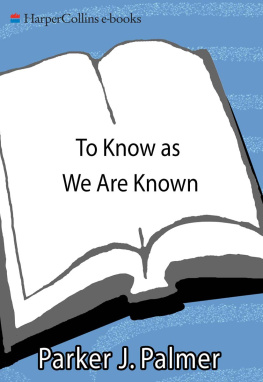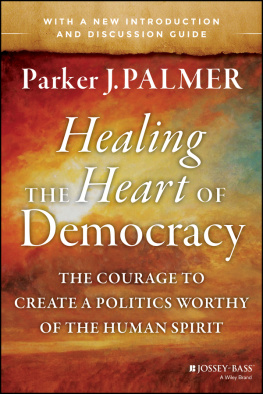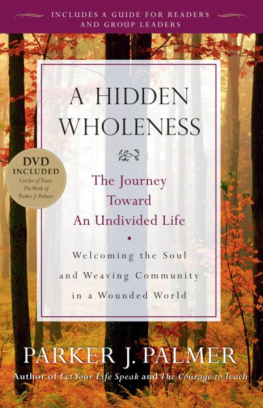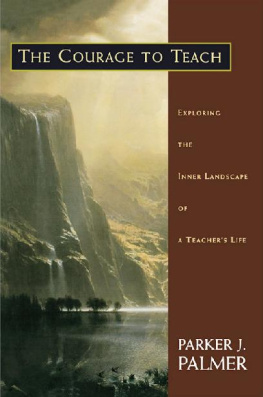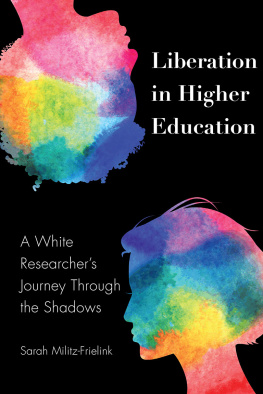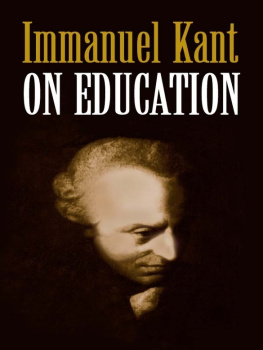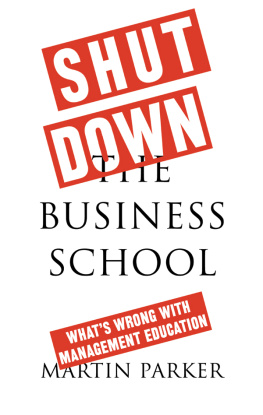Parker J. Palmer - To Know as We Are Known: A Spirituality of Education
Here you can read online Parker J. Palmer - To Know as We Are Known: A Spirituality of Education full text of the book (entire story) in english for free. Download pdf and epub, get meaning, cover and reviews about this ebook. year: 2010, publisher: HarperCollins, genre: Religion. Description of the work, (preface) as well as reviews are available. Best literature library LitArk.com created for fans of good reading and offers a wide selection of genres:
Romance novel
Science fiction
Adventure
Detective
Science
History
Home and family
Prose
Art
Politics
Computer
Non-fiction
Religion
Business
Children
Humor
Choose a favorite category and find really read worthwhile books. Enjoy immersion in the world of imagination, feel the emotions of the characters or learn something new for yourself, make an fascinating discovery.
- Book:To Know as We Are Known: A Spirituality of Education
- Author:
- Publisher:HarperCollins
- Genre:
- Year:2010
- Rating:5 / 5
- Favourites:Add to favourites
- Your mark:
- 100
- 1
- 2
- 3
- 4
- 5
To Know as We Are Known: A Spirituality of Education: summary, description and annotation
We offer to read an annotation, description, summary or preface (depends on what the author of the book "To Know as We Are Known: A Spirituality of Education" wrote himself). If you haven't found the necessary information about the book — write in the comments, we will try to find it.
This primer on authentic education explores how mind and heart can work together in the learning process. Moving beyond the bankruptcy of our current model of education, Parker Palmer finds the soul of education through a lifelong cultivation of the wisdom each of us possesses and can share to benefit others.
To Know as We Are Known: A Spirituality of Education — read online for free the complete book (whole text) full work
Below is the text of the book, divided by pages. System saving the place of the last page read, allows you to conveniently read the book "To Know as We Are Known: A Spirituality of Education" online for free, without having to search again every time where you left off. Put a bookmark, and you can go to the page where you finished reading at any time.
Font size:
Interval:
Bookmark:
For Brent and Todd and Carrie
The Recovery of Community in Education
The Hidden Wholeness
Ten years ago, when this book was first published, I thought I knew who my readers would befaculty at church-related colleges and seminaries, professors of religion, and people involved in religious education. After all, the book is about the spiritual dimension of education, and conventional wisdom tells us that educators range from indifferent to cynical on matters of the spirit.
But now, I am delighted that To Know as We Are Known has reached a wider and more diverse audience than I had thought possible. Today, I spend half my time on the road, exploring the issues in this book with faculty at public schools and state universities, at independent colleges and major research institutionsfaculty who are Jewish or Muslim or Buddhist or who have no formal religious identity. Grateful as I am for my continuing conversation with educators in church-related settings, this dialogue amid diversity has enlarged and enriched my thinking.
Why has a book about the spirituality of education, written from a Christian viewpoint, reached such a pluralistic audience? I hope it is partly because this book offers a spirituality that respects other traditions and is eager to learn from them. But I know there is a more basic explanation: educators of all sorts are in real pain these days, and that pain has compelled them to explore unconventional resources.
When suffering becomes intense, we are forced to examine the deeper dimensions of our condition and to consider sources of insight that may have seemed uncouth when we and our world were humming with power and success. The teachers I meet have no illusions that education is working. They know that students are often served poorly in the classroom, and that their own growth as teachers is not supported by the system. They are weary of their professions tendency to seek shallow technical fixes for complex human problems. They are ready to look beyond technique for whatever guidance may come from spiritual traditions.
I call the pain that permeates education the pain of disconnection. Everywhere I go, I meet faculty who feel disconnected from their colleagues, from their students, and from their own hearts. Most of us go into teaching not for fame or fortune but because of a passion to connect. We feel deep kinship with some subject; we want to bring students into that relationship, to link them with the knowledge that is so life-giving to us; we want to work in community with colleagues who share our values and our vocation. But when institutional conditions create more combat than community, when the life of the mind alienates more than it connects, the heart goes out of things, and there is little left to sustain us.
In the midst of such pain, the spiritual traditions offer hope that is hard to find elsewhere, for all of them are ultimately concerned with getting us reconnected. These traditions build on the great truth that beneath the broken surface of our lives there remainsin the words of Thomas Mertona hidden wholeness. The hope of every wisdom tradition is to recall us to that wholeness in the midst of our torn world, to reweave us into the community that is so threadbare today. That, I think, is why the spirituality of education is now being explored in so many unlikely places. Perhaps the ancient communal act called teaching and learning can be renewed by drawing upon spiritual wisdom.
But if the spiritual traditions have wisdom to offer, we who speak for them have often spoken unwisely. I admire the patience of those secular educators who are still willing to explore issues in spirituality, for the sad fact is that past marriages of religion and education have done education at least as much harm as good. Too often, the spiritual traditions have been used to obstruct inquiry rather than encourage it. Too often, would-be educators who profess religious faith turn out to fear truth, rather than welcome it in all its forms.
That is why I devoted this book to a spirituality of sources in education rather than one of ends. A spirituality of ends wants to dictate the desirable outcomes of education in the life of the student. It uses the spiritual tradition as a template against which the ideas, beliefs, and behaviors of the student are to be measured. The goal is to shape the student to the template by the time his or her formal education concludes.
But that sort of education never gets started; it is no education at all. Authentic spirituality wants to open us to truthwhatever truth may be, wherever truth may take us. Such a spirituality does not dictate where we must go, but trusts that any path walked with integrity will take us to a place of knowledge. Such a spirituality encourages us to welcome diversity and conflict, to tolerate ambiguity, and to embrace paradox. By this understanding, the spirituality of education is not about dictating ends. It is about examining and clarifying the inner sources of teaching and learning, ridding us of the toxins that poison our hearts and minds.
For example, an authentic spirituality of education will address the fear that so often permeates and destroys teaching and learning. It will understand that fear, not ignorance, is the enemy of learning, and that fear is what gives ignorance its power. It will try to root out our fear of having our ignorance exposed and our orthodoxies challengedwhether those orthodoxies are religious or secular. A spirituality of education will ground us in the confidence that our search for truth, and truths search for us, can lead to new life beyond the death of our half-truths and narrow concepts.
The Community of Truth
My encounters with diverse educators over the past decade have led me to reformulate one of the images central to this book. In Chapters 5 and 6, I suggest that to teach is to create a space in which obedience to truth is practiced. Because that image is crucial to my notion of authentic education, I have been distressed to discover that some people are unable to explore it openly because they distrust the idea of obedience.
Although I tried, in the book, to rescue obedience from its authoritarian connotations, I understand why some people resist the word. For African-Americans, women, young people, and other historically marginalized people, the notion of obedience has too often been used to keep them in their place and to justify unjust power. Obey whose truth? is the question they always ask meand despite my answer, The one that emerges between us, our dialogue often gets derailed. Because I believe that the gift of language should be used to bridge our gaps, not widen them, I wanted to find a more inclusive way to say what I meant by practicing obedience to truth.
Several years ago, I found a phrase that is faithful to my original intent, but that stimulates rather than stops conversation: To teach is to create a space in which the community of truth is practiced. This community of truth is what I originally meant by obediencea rich and complex network of relationships in which we must both speak and listen, make claims on others, and make ourselves accountable. This new image makes it easier to explore with others the pain of disconnection, and to seek remedies consistent with the nature of education at its best.
Because the pain of disconnection has become so severe, there is more talk today then there was ten years ago about the recovery of community in education. If that talk is to bear fruit, we need to use images of community consistent with the aims of education, which I take to be knowing, teaching , and learning . The community of truth should be our goal. Unfortunately, the discussion about community in education is seldom framed in this way. Instead, we borrow communal images from other realms, impose them on education, and then wonder why we get so much friction and such a poor fit.
Font size:
Interval:
Bookmark:
Similar books «To Know as We Are Known: A Spirituality of Education»
Look at similar books to To Know as We Are Known: A Spirituality of Education. We have selected literature similar in name and meaning in the hope of providing readers with more options to find new, interesting, not yet read works.
Discussion, reviews of the book To Know as We Are Known: A Spirituality of Education and just readers' own opinions. Leave your comments, write what you think about the work, its meaning or the main characters. Specify what exactly you liked and what you didn't like, and why you think so.

